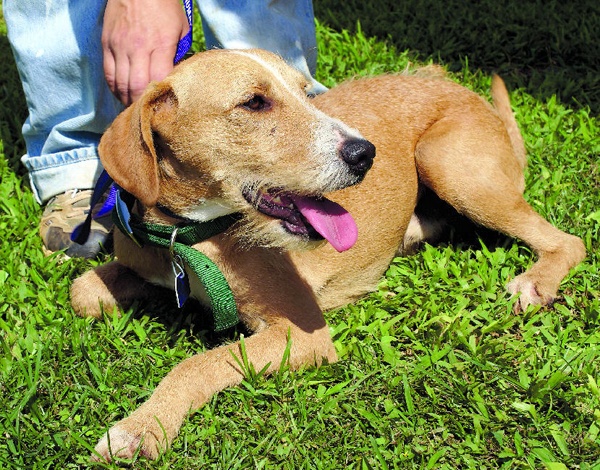LIHUE — The Kauai County Council’s Finance Committee by a 3-2 vote approved Wednesday a bill that raises dog license fees, but included an amendment to soften the blow on hunters. “Hunters are providing an important service, an environmental service
LIHUE — The Kauai County Council’s Finance Committee by a 3-2 vote approved Wednesday a bill that raises dog license fees, but included an amendment to soften the blow on hunters.
“Hunters are providing an important service, an environmental service to this county that warrants a special recognition,” Committee Chair Tim Bynum said of the feral pig control that hunters provide. “And that doesn’t even go into the cultural and historical issues regarding hunters.”
Bill 2490, which would provide more funds to the Kauai Humane Society, now goes to full council for second and final reading next week. The bill would raise to $15 from $2 the two-year dog license fee for spayed or neutered animals. For unaltered dogs, a license would increase to $50 from $6.
The proposal originally intended to eliminate an exemption that allowed hunters to pay $6 for their first dog, and $2 for each subsequent dog, regardless if the animal had been altered.
The bill’s amended version reinstates the hunters’ exemption, and sets their fees at $15 for the first dog, and $7 for each subsequent dog, whether it has been spayed or neutered.
When the bill was first introduced weeks ago, it took harsh criticism from hunters, who usually have many dogs, with some of them unaltered to keep a bloodline going.
For an average hunter with 20 dogs, the original bill could mean a $1,000 per year in fees. The amended bill brings the cost down to $39.50 per year for a hunter with 20 dogs.
Despite the amendment that lessened the burden on hunters, some of them weren’t satisfied.
“I say this bill is illegal, and is targeting dogs,” hunter Robert Cremer Jr. said. He added the bill should be abolished, and the council should introduce a new proposal addressing license fees for all animals serviced by KHS.
“Make it legal, if not we’re going to find our legal way for do things,” he said.
Cremer said the bill also discriminates non-hunters. If he is going to pay $15 and $7, then the rest of the dog owners should pay the same, he said.
“I’m not about me and my hunters; I’m about real and what is right and what is equal,” he said.
Cremer said he estimates there are 25,000 dogs on the island, and only 5,000 are being taxed. If the county went after all other dog owners, this bill wouldn’t be necessary, he said.
Later, after the bill had been approved, Cremer said it costs $10 for a class to obtain a hunting license, which would allow anyone to pay the same fees that will be charged to hunters.
The website for the state Department of Land and Natural Resources, Division of Forestry and Wildlife offers hunting licenses for $10 for residents who have a Hawaii Hunter Education Certificate. The license is free for senior citizens of age 65 or older.
Not my bill
“This has been referred to as a Humane Society’s bill,” KHS Executive Director Penny Cistaro said. “I would like to remind the council that it was requested by you.”
By state law, the county has to contract KHS to seize and impound stray dogs. Cats are not a requirement.
But in previous years, the contract signed between the county and KHS asked for the nonprofit to provide an adoption program and services to small animals, Cistaro said.
The council approved $760,000 for KHS for the current fiscal year, including a $65,000 grant for spay and neuter services, according to Cistaro. The funding reflected a $100,000 increase from the previous five years.
But Cistaro said the funding is not enough. KHS spends about $750,000 providing services for dogs and $366,000 for cats each year, totaling more than $1.1 million.
Additionally, in the last four years, KHS has used $2.7 million of its own money to keep providing services, she said, adding the council has been aware for at least two years that the nonprofit has been subsidizing the contract with the administration.
Cistaro said KHS receives or collects some 1,600 dogs and 2,400 cats each year. About 56 percent of dogs are reunited with their owners, and only 10 percent of cats are claimed by owners.
Though these numbers seem low, Cistaro said the national average for cats that are reunited with their owners is 6 to 7 percent. The higher average on Kauai is due to KHS’ “aggressive” microchip program, she said.
Cats and dogs
Early in the meeting, Councilman Ross Kagawa tried to kill the bill by making a motion to receive it without action. But he only got support from Councilman Mel Rapozo, and the motion was defeated by a 3-2 vote.
When the bill came to a final vote, Rapozo and Kagawa voted against it. They said they support KHS but had their reasons to oppose the bill.
“How much, really, are we funding at that rate?” Rapozo said of the contract with KHS, regarding the nonprofit caring for cats and other small animals, besides dogs.
He also said the bill is counter-productive because the increase is too much and will discourage dog owners from registering their animals.
Kagawa said dog owners cannot pay for all other animals at KHS.
He said he would rather would support a money bill to add more funding to KHS, which he would do after the county receives the Comprehensive Annual Financial Report in December.
Councilwoman JoAnn Yukimura said the bill was overdue — the current fees were set 25 years ago. But she also felt there is a need to bring cats up to par with dogs.
“I commit myself to introduce a cat licensing fee as soon as possible,” she said.


